|
Previous Page
Hawkwind - "Hawkwind" (Liberty 1970)
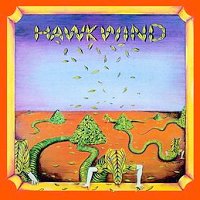 The definitive space-rock group for my money. Few or no other band combined the power and guts of rock with the mystical atmosphere of space and the universe better than Hawkwind. They were also the only band I'm aware of who could be pretentious and ambitious but still have a rough and down-to-earth attitude. Their debut was not exactly their most memorable effort, as their signature sound was still not developed. The album opened with "Hurry On Sundown" and it was also the single of the album. This folk-track was not representative for Hawkwind at all, and David Brock's distinctive vocal was the only Hawkwind-trademark that could be heard here. Then follows a string of free-form, spacey improvisations and jams including primitive electronic effects and Nik Taylor's distorted and twisted sax-playing to make the spacey atmosphere. These noisy and unstructured tracks has more in common with early, experimental Pink Floyd and Tangerine Dream's first album than the classic Hawkwind-sound. The album closes on a more structured note with "Mirror of Illusion" and this is next to "Hurry on Sundown" the only track here that can be counted as a song. This was a very embryonic debut and of interest to die-hard fans only. The definitive space-rock group for my money. Few or no other band combined the power and guts of rock with the mystical atmosphere of space and the universe better than Hawkwind. They were also the only band I'm aware of who could be pretentious and ambitious but still have a rough and down-to-earth attitude. Their debut was not exactly their most memorable effort, as their signature sound was still not developed. The album opened with "Hurry On Sundown" and it was also the single of the album. This folk-track was not representative for Hawkwind at all, and David Brock's distinctive vocal was the only Hawkwind-trademark that could be heard here. Then follows a string of free-form, spacey improvisations and jams including primitive electronic effects and Nik Taylor's distorted and twisted sax-playing to make the spacey atmosphere. These noisy and unstructured tracks has more in common with early, experimental Pink Floyd and Tangerine Dream's first album than the classic Hawkwind-sound. The album closes on a more structured note with "Mirror of Illusion" and this is next to "Hurry on Sundown" the only track here that can be counted as a song. This was a very embryonic debut and of interest to die-hard fans only.
Hawkwind - "In Search of Space" (United Artists 1971)
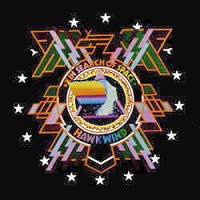 A tremendous improvement over the debut, and "In Search of Space" is generally regarded as the first classic Hawkwind-release. The band had pretty much found their signature sound of hard rocking guitar-riffs built around lengthy, spacey excursions stuffed with weird electronic sounds and Turner's unique and atmospheric saxophone and flute-playing. The album included the first classic Hawkwind-riff and anthem in "Masters of the Universe". The 15-minute opener "You Shouldn't Do That" became another classic and stage-favourite. The band still messed around with some quite free-floating improvisations in "You Know You're Only Dreaming" and "Adjust Me" but both were of a much more consistent kind than anything on the debut-album. Even the two acoustic tracks "We Took the Wrong Step Years Ago" and "Children of the Sun" has a great spacey atmosphere that will make your mind float. A very important album in the band's history. A tremendous improvement over the debut, and "In Search of Space" is generally regarded as the first classic Hawkwind-release. The band had pretty much found their signature sound of hard rocking guitar-riffs built around lengthy, spacey excursions stuffed with weird electronic sounds and Turner's unique and atmospheric saxophone and flute-playing. The album included the first classic Hawkwind-riff and anthem in "Masters of the Universe". The 15-minute opener "You Shouldn't Do That" became another classic and stage-favourite. The band still messed around with some quite free-floating improvisations in "You Know You're Only Dreaming" and "Adjust Me" but both were of a much more consistent kind than anything on the debut-album. Even the two acoustic tracks "We Took the Wrong Step Years Ago" and "Children of the Sun" has a great spacey atmosphere that will make your mind float. A very important album in the band's history.
Hawkwind - "Doremi Fasol Latido" (United Artists 1972)
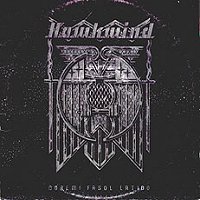 On their 3rd album, Hawkwind was joined by a new bass-player in Ian "Lemmy" Kilmister who further solidified the band's powerful sound. The album boasted two new Hawkwind-classics in the incredible intense and energetic "Brainstorm" and the more acoustic "Space is Deep". These two tracks demonstrated both sides of the band's sound in an incredible way. And in the case of "Brainstorm" it's really fascinating of how such a rough and noisy piece of music still can be so atmospheric and dreamy. But the album had much more to offer too. "Lord of Light" is a superb rocker with a great vocal melody and "Down Through the Night" is, despite its simplicity, one of their best acoustic tracks. "Time We Left This World Today" consists of repetitive riffs and aggressive jams where Lemmy's bass-playing really takes off. The only track on the album that I don't care much for is Lemmy's own "The Watcher". It's probably not a coincidence that they placed it last on the album, as it's a weak and forgettable track. Still, most of the album is space-rock at its best and most energetic. On their 3rd album, Hawkwind was joined by a new bass-player in Ian "Lemmy" Kilmister who further solidified the band's powerful sound. The album boasted two new Hawkwind-classics in the incredible intense and energetic "Brainstorm" and the more acoustic "Space is Deep". These two tracks demonstrated both sides of the band's sound in an incredible way. And in the case of "Brainstorm" it's really fascinating of how such a rough and noisy piece of music still can be so atmospheric and dreamy. But the album had much more to offer too. "Lord of Light" is a superb rocker with a great vocal melody and "Down Through the Night" is, despite its simplicity, one of their best acoustic tracks. "Time We Left This World Today" consists of repetitive riffs and aggressive jams where Lemmy's bass-playing really takes off. The only track on the album that I don't care much for is Lemmy's own "The Watcher". It's probably not a coincidence that they placed it last on the album, as it's a weak and forgettable track. Still, most of the album is space-rock at its best and most energetic.
Hawkwind - "Space Ritual" (United Artists 1973)
 Late in '72 Hawkwind was joined by the "space-poet" Robert Calvert and went out on the road with their legendary "Space Ritual" show, which supposedly featured a light show that was very impressive for its time. The tour resulted in this double live-album that is Hawkwind's best and most important recording from the earliest phase in their career (1970-73). And it's not hard to understand why. For nearly 90 minutes you get a full dose of their classic, noisy and raw space-rock performed with an enormous energy and intensity. With the exception of "The Watcher", you get all the tracks from "Dore...". From "In Search..." you get a real high-energy version of "Master of the Universe". And you also get a bunch of tracks they never recorded in the studio, including Hawkwind classics such as "Born to Go", "Orgone Accumulator" and "Seven by Seven". All the tracks are tied together by some short interludes, usually some weird poems by Calvert where space (surprise, surprise) is the main theme. The funniest and best known of these is probably "Sonic Attack", instructions for how to behave "in case of sonic attack!". And the band also plays some of the tracks a little bit different from the studio recordings, like the electric versions of "Down Through the Night" and "Space is Deep". Overall, "Space Ritual" has all the trademarks of a classic live-album: good sound quality, inspired and energetic playing that threatens to kick the ass of the studio-versions and (thank god!) NO drum-solos! Essential stuff for any space-rock fan, and the band still had their best studio-albums ahead of them. Late in '72 Hawkwind was joined by the "space-poet" Robert Calvert and went out on the road with their legendary "Space Ritual" show, which supposedly featured a light show that was very impressive for its time. The tour resulted in this double live-album that is Hawkwind's best and most important recording from the earliest phase in their career (1970-73). And it's not hard to understand why. For nearly 90 minutes you get a full dose of their classic, noisy and raw space-rock performed with an enormous energy and intensity. With the exception of "The Watcher", you get all the tracks from "Dore...". From "In Search..." you get a real high-energy version of "Master of the Universe". And you also get a bunch of tracks they never recorded in the studio, including Hawkwind classics such as "Born to Go", "Orgone Accumulator" and "Seven by Seven". All the tracks are tied together by some short interludes, usually some weird poems by Calvert where space (surprise, surprise) is the main theme. The funniest and best known of these is probably "Sonic Attack", instructions for how to behave "in case of sonic attack!". And the band also plays some of the tracks a little bit different from the studio recordings, like the electric versions of "Down Through the Night" and "Space is Deep". Overall, "Space Ritual" has all the trademarks of a classic live-album: good sound quality, inspired and energetic playing that threatens to kick the ass of the studio-versions and (thank god!) NO drum-solos! Essential stuff for any space-rock fan, and the band still had their best studio-albums ahead of them.
Hawkwind - "Hall of the Mountain Grill" (United Artists 1974)
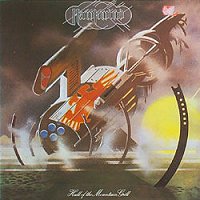 Hawkwind was joined by violinist Simon House (ex-High Tide) on their 5th album. Some of the heaviest riffs were toned down a bit in favour of much more majestic and symphonic soundscapes dominated by organ, synths, Mellotron, violin and choir. This can be heard especially well on the beautiful instrumental "Wind of Change" and the fantastic, grandiose and very atmospheric "D-Rider". The production and arrangements of the latter have to be some of the biggest sounding and most spacey ever. But the band could still rock hard and energetic on "You'd Better Believe It" and the best song Lemmy ever wrote for the band: "Lost Johnny". The best-known track from the album, "Psychedelic Warlords (Disappear in Smoke)" and "Paradox" fused the old riff-style with their newfound symphonic sound in a very striking way. And in between all these tracks are also some short interludes like "Goat Willow" and the title-track. "Hall of the Mountain Grill" is a masterpiece of symphonic space-rock, and only the following album is next to it as Hawkwind's best studio-release. Hawkwind was joined by violinist Simon House (ex-High Tide) on their 5th album. Some of the heaviest riffs were toned down a bit in favour of much more majestic and symphonic soundscapes dominated by organ, synths, Mellotron, violin and choir. This can be heard especially well on the beautiful instrumental "Wind of Change" and the fantastic, grandiose and very atmospheric "D-Rider". The production and arrangements of the latter have to be some of the biggest sounding and most spacey ever. But the band could still rock hard and energetic on "You'd Better Believe It" and the best song Lemmy ever wrote for the band: "Lost Johnny". The best-known track from the album, "Psychedelic Warlords (Disappear in Smoke)" and "Paradox" fused the old riff-style with their newfound symphonic sound in a very striking way. And in between all these tracks are also some short interludes like "Goat Willow" and the title-track. "Hall of the Mountain Grill" is a masterpiece of symphonic space-rock, and only the following album is next to it as Hawkwind's best studio-release.
Hawkwind - "Warrior on the Edge of Time" (United Artists 1975)
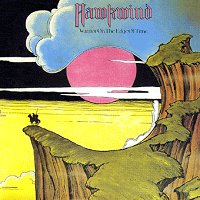 The band's 5th studio-release turned out to be their most ambitious album ever, and the cover that folded out into a shield was just the first clue. They hired sci-fi writer Mike Moorcock to help with some of the lyrical concept, and he also read several poems in between the tracks. Never before or after had Hawkwind (or any other band for that matter) better blended old fashioned fantasy-elements with futuristic sci-fi and space-influences. And the material, and not at least the arrangements was some of the band's best ever. The two opening tracks "Assault and Battery" and "The Golden Void" floats into each other, and next to "D-Rider" these are Hawkwind's most majestic and biggest sounding tracks ever. The arrangements here have to be heard to be believed. Tons of Mellotron, synths and distorted sax and flute create a very unique sound that actually sounded like no other band. The guitar is toned unusually much down here, but it would be more dominant in the sound later on the album. After a short poem we're then taken straight away to space in the hypnotic and dreamy instrumental "Opa-Loka". "The Demented Man" is another of those lovely acoustic Hawkwind-tunes where the band really managed to keep the obligatory space-feel. The energetic "Magnu" was the first track on the album to feature a quite heavy riff, but it was actually more dominated by Simon House's excellent violin-playing. This could very well be his best performance on a Hawkwind-album. Then we're getting more poems by Moorcock and another spacey, synth-drenched instrumental in "Spiral Galaxy 28948". The album closes with "Kings of Speed" and this catchy and straight-forward hard-rocker was chosen as the single from the album. Dave Brock himself regards "Warrior on the Edge of Time" as the band's crowning achievement, and most progressive rock fans rates it next to "Hall of the Mountain Grill" as Hawkwind's best album. The band's 5th studio-release turned out to be their most ambitious album ever, and the cover that folded out into a shield was just the first clue. They hired sci-fi writer Mike Moorcock to help with some of the lyrical concept, and he also read several poems in between the tracks. Never before or after had Hawkwind (or any other band for that matter) better blended old fashioned fantasy-elements with futuristic sci-fi and space-influences. And the material, and not at least the arrangements was some of the band's best ever. The two opening tracks "Assault and Battery" and "The Golden Void" floats into each other, and next to "D-Rider" these are Hawkwind's most majestic and biggest sounding tracks ever. The arrangements here have to be heard to be believed. Tons of Mellotron, synths and distorted sax and flute create a very unique sound that actually sounded like no other band. The guitar is toned unusually much down here, but it would be more dominant in the sound later on the album. After a short poem we're then taken straight away to space in the hypnotic and dreamy instrumental "Opa-Loka". "The Demented Man" is another of those lovely acoustic Hawkwind-tunes where the band really managed to keep the obligatory space-feel. The energetic "Magnu" was the first track on the album to feature a quite heavy riff, but it was actually more dominated by Simon House's excellent violin-playing. This could very well be his best performance on a Hawkwind-album. Then we're getting more poems by Moorcock and another spacey, synth-drenched instrumental in "Spiral Galaxy 28948". The album closes with "Kings of Speed" and this catchy and straight-forward hard-rocker was chosen as the single from the album. Dave Brock himself regards "Warrior on the Edge of Time" as the band's crowning achievement, and most progressive rock fans rates it next to "Hall of the Mountain Grill" as Hawkwind's best album.
Label
Hawkwind - "Astounding Sounds, Amazing Music" (Charisma 1976)
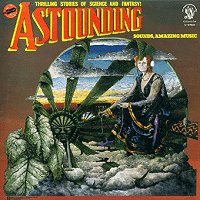 Lemmy had been fired from the band on their US-tour in 1975 after being jailed for possessing drugs, and Paul Rudolph replaced him. The band would from then have a rather unstable line-up with many personnel-changes over the years. Robert Calvert had also joined the band on a permanent basis and he took over most of the vocals on "Astounding Sounds, Amazing Music" that also was their first album for Charisma. But despite the promising title, the album wasn't on the same level as "Hall of the Mountain Grill" and "Warrior on the Edge of Time" and was probably their weakest release since the debut-album. The three instrumentals on the record go nowhere, and sounds all like some unfinished leftovers. "City of Lagoons" sounds even like a Gong-clone. The choice for a single was yet again a simple and rocking tune, this time called "Kerb Crawler". One of the most interesting tracks here is "Kadu Flyer". It starts as a tasty and melodic tune that gradually becomes more and more eastern-influenced. The opener "Refer Madness" and "Steppenwolf" are both decent tunes, but nothing special or outstanding. "Astounding Sounds, Amazing Music" can unfortunately not be counted among with Hawkwind's best albums. Lemmy had been fired from the band on their US-tour in 1975 after being jailed for possessing drugs, and Paul Rudolph replaced him. The band would from then have a rather unstable line-up with many personnel-changes over the years. Robert Calvert had also joined the band on a permanent basis and he took over most of the vocals on "Astounding Sounds, Amazing Music" that also was their first album for Charisma. But despite the promising title, the album wasn't on the same level as "Hall of the Mountain Grill" and "Warrior on the Edge of Time" and was probably their weakest release since the debut-album. The three instrumentals on the record go nowhere, and sounds all like some unfinished leftovers. "City of Lagoons" sounds even like a Gong-clone. The choice for a single was yet again a simple and rocking tune, this time called "Kerb Crawler". One of the most interesting tracks here is "Kadu Flyer". It starts as a tasty and melodic tune that gradually becomes more and more eastern-influenced. The opener "Refer Madness" and "Steppenwolf" are both decent tunes, but nothing special or outstanding. "Astounding Sounds, Amazing Music" can unfortunately not be counted among with Hawkwind's best albums.
Hawkwind - "Masters of the Universe" (United Artists 1977)
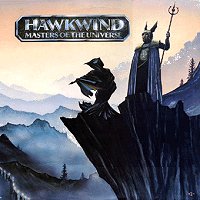 United Artists was of course quick to release a compilation after they lost Hawkwind from their label. "Masters of the Universe" was actually the first Hawkwind-album I bought, and while it features lots superb music it still lacks too many obligatory Hawkwind-tracks to be anything more than a supplement to the "Roadhawks"-compilation released the year before. That album focused a lot on single-tracks that wasn't to be found on any album, while "Masters of the Universe" is more orientated towards album-material. The only exception is "It's So Easy" that was the B-side of the "Psychedelic Warlords"-single. This is to my knowledge the only place to hear this track on an album. The arrangement would have fitted nicely into "Hall of the Mountain Grill" but the track itself is mediocre. The rest of the album is made up of "Master of the Universe", "Brainstorm", "Sonic Attack", "Orgone Accumulator" and "Lost Johnny". Great tracks from start to finish, but get the original albums instead as they're all worth having. United Artists was of course quick to release a compilation after they lost Hawkwind from their label. "Masters of the Universe" was actually the first Hawkwind-album I bought, and while it features lots superb music it still lacks too many obligatory Hawkwind-tracks to be anything more than a supplement to the "Roadhawks"-compilation released the year before. That album focused a lot on single-tracks that wasn't to be found on any album, while "Masters of the Universe" is more orientated towards album-material. The only exception is "It's So Easy" that was the B-side of the "Psychedelic Warlords"-single. This is to my knowledge the only place to hear this track on an album. The arrangement would have fitted nicely into "Hall of the Mountain Grill" but the track itself is mediocre. The rest of the album is made up of "Master of the Universe", "Brainstorm", "Sonic Attack", "Orgone Accumulator" and "Lost Johnny". Great tracks from start to finish, but get the original albums instead as they're all worth having.
Hawkwind - "Quark Strangeness and Charm" (Charisma 1977)
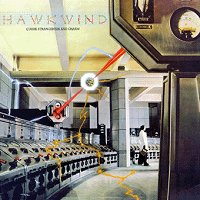 Hawkwind went through a series of personnel-changes in the last half of the 70's. Nik Turner was unfortunately one of those who left, stripping the band's sound for his distinctive sax/flute-playing. But the first album without him was a return to form after the slightly disappointing "Astounding Sounds, Amazing Music". "Quark Strangeness and Charm" was stuffed with strong tunes; several of them are classic Hawkwind. "Spirit of the Age" and the superb post-nuclear war tale "Damnation Alley" were both great examples of Hawkwind's energetic, yet atmospheric space rock. The title-track is a simple but irresistible catchy rocker, while the ballad "Fable of a Failed Race" is Hawkwind from their most beautiful, melodic and atmospheric side. House's violin on the opening of the eastern-influenced "Hassan I Sahba" reminds me a bit of early East of Eden, and that's not a bad thing at all. "The Forge of Vulcan" is a hypnotic instrumental number that was far more creative and original than any of the three instrumentals from the previous album. "Days of the Underground" is a typical mid-tempo Hawkwind track, with a quirky melody and lots of spacey synths. This one glides right into the short and heavy instrumental "Iron Dream" that closes the album in a nice way. "Quark Strangeness and Charm" proved that Hawkwind could deliver good albums even without Lemmy and Turner. Hawkwind went through a series of personnel-changes in the last half of the 70's. Nik Turner was unfortunately one of those who left, stripping the band's sound for his distinctive sax/flute-playing. But the first album without him was a return to form after the slightly disappointing "Astounding Sounds, Amazing Music". "Quark Strangeness and Charm" was stuffed with strong tunes; several of them are classic Hawkwind. "Spirit of the Age" and the superb post-nuclear war tale "Damnation Alley" were both great examples of Hawkwind's energetic, yet atmospheric space rock. The title-track is a simple but irresistible catchy rocker, while the ballad "Fable of a Failed Race" is Hawkwind from their most beautiful, melodic and atmospheric side. House's violin on the opening of the eastern-influenced "Hassan I Sahba" reminds me a bit of early East of Eden, and that's not a bad thing at all. "The Forge of Vulcan" is a hypnotic instrumental number that was far more creative and original than any of the three instrumentals from the previous album. "Days of the Underground" is a typical mid-tempo Hawkwind track, with a quirky melody and lots of spacey synths. This one glides right into the short and heavy instrumental "Iron Dream" that closes the album in a nice way. "Quark Strangeness and Charm" proved that Hawkwind could deliver good albums even without Lemmy and Turner.
Hawkwind - "Levitation" (Bronze 1980)
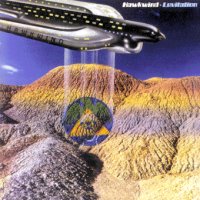 Hawkwind switched label again, this time from Charisma to Bronze. Their first 80's release "Levitation" turned out to be one of their best albums ever. The record sounded fresh and energetic, and they had got no one else than the legendary Ginger Baker on drums. The album didn't feature a weak track at all; instead we got several new Hawkwind-classics. The title-track burst with energy, a catchy chorus and a complex and driving instrumental-part in the middle. "Motorway City" became a stage-favourite, and is a pleasant mid-tempo track with more instrumental shining from the band. There are also two pure instrumentals here, "World of Tiers" and "Space Chase". Both are superb space-journeys with energetic themes driven forward by the guitars and synths. The anthemic "Who's Gonna Win the War" was a very natural choice as the single from the album. "The 5th Second of Forever" and the closing-number "Dust of Time" was more powerful and futuristic space-rock at its best. The competition was not exactly very hard, but "Levitation" was with no doubt one of the best albums released in 1980. Hawkwind switched label again, this time from Charisma to Bronze. Their first 80's release "Levitation" turned out to be one of their best albums ever. The record sounded fresh and energetic, and they had got no one else than the legendary Ginger Baker on drums. The album didn't feature a weak track at all; instead we got several new Hawkwind-classics. The title-track burst with energy, a catchy chorus and a complex and driving instrumental-part in the middle. "Motorway City" became a stage-favourite, and is a pleasant mid-tempo track with more instrumental shining from the band. There are also two pure instrumentals here, "World of Tiers" and "Space Chase". Both are superb space-journeys with energetic themes driven forward by the guitars and synths. The anthemic "Who's Gonna Win the War" was a very natural choice as the single from the album. "The 5th Second of Forever" and the closing-number "Dust of Time" was more powerful and futuristic space-rock at its best. The competition was not exactly very hard, but "Levitation" was with no doubt one of the best albums released in 1980.
High Tide - "Sea Shanties" (Liberty 1969)
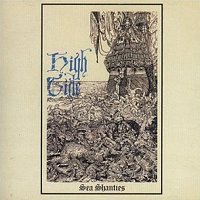 The first album by this British group sounds like early Hawkwind, but without all the space stuff. The music is quite raw and heavy, but the violin playing of Simon House and the complexity of the songs made them more than just a average hard-rock band. My favourite track is "Death Warmed Up", an incredible intense and energetic jam with great riffs. "Pushed, But Not Forgotten" and "Nowhere" are the group from their more controlled side, and shows that they have some great melodic sense too. And the opening track "Futilist's Lament" sounds almost like classic Black Sabbath. This album may not fit into everyone's definition of the word "progressive", but it's a very good album anyway. And as long as the music is good, then I personally don't give a shit about what kind of music it is. The first album by this British group sounds like early Hawkwind, but without all the space stuff. The music is quite raw and heavy, but the violin playing of Simon House and the complexity of the songs made them more than just a average hard-rock band. My favourite track is "Death Warmed Up", an incredible intense and energetic jam with great riffs. "Pushed, But Not Forgotten" and "Nowhere" are the group from their more controlled side, and shows that they have some great melodic sense too. And the opening track "Futilist's Lament" sounds almost like classic Black Sabbath. This album may not fit into everyone's definition of the word "progressive", but it's a very good album anyway. And as long as the music is good, then I personally don't give a shit about what kind of music it is.
High Tide - "High Tide" (Liberty 1970)
 I guess most of you would regard this album as a more progressive record than the first one. The album consists of just three long tracks, and all of them are with no doubt progressive rock. The album is less raw sounding, and the group had also began to use some organ and piano to good effect. The vocal parts of both "Blankman Cries Again" and "Saneonymous" is pure heaven, and the violin sounds great as always. It's not so much more to say. This is simply a great album, and progressive purists would probably like to check this one out before "Sea Shanties". I guess most of you would regard this album as a more progressive record than the first one. The album consists of just three long tracks, and all of them are with no doubt progressive rock. The album is less raw sounding, and the group had also began to use some organ and piano to good effect. The vocal parts of both "Blankman Cries Again" and "Saneonymous" is pure heaven, and the violin sounds great as always. It's not so much more to say. This is simply a great album, and progressive purists would probably like to check this one out before "Sea Shanties".
Hoelderlin - "Hoelderlin" (Intercord 1975)
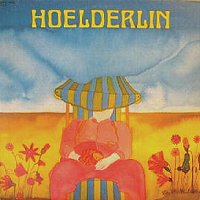 The self-titled second album by this German band is still the only of their releases that I'm familiar with. The arrangements features things like mellotron, flute, sax and violin, but the lack of really memorable songwriting plagues the album. "Schwebebahn" is an instrumental-number that opens the record in a rather eastern-sounding way. The track is stuffed with mellotron and percussion, and is fascinating for a while, but runs out of steam after a while. The next track "I Love My Dog" is a much less dramatic track with some folk-influences. Nice acoustic guitar and flute gives a pleasant arrangement, but the melodies are rather mediocre. "Honeypot" starts nice with a very fairytale-like introduction, but most of the track is just a rather pointless and uninteresting jam. "NŁrnberg" is the shortest track on the album, but it has actually the strongest melody of all the songs. The 17-minute "Death-Watch-Beetle" combines long instrumental-parts dominated by violin and vocal parts that varies from symphonic to folk-influenced. It would have been good if it had been at least 10 minutes shorter. It features some nice parts, but also too much dead meat to justify the length of it. An album mostly for collectors only. The self-titled second album by this German band is still the only of their releases that I'm familiar with. The arrangements features things like mellotron, flute, sax and violin, but the lack of really memorable songwriting plagues the album. "Schwebebahn" is an instrumental-number that opens the record in a rather eastern-sounding way. The track is stuffed with mellotron and percussion, and is fascinating for a while, but runs out of steam after a while. The next track "I Love My Dog" is a much less dramatic track with some folk-influences. Nice acoustic guitar and flute gives a pleasant arrangement, but the melodies are rather mediocre. "Honeypot" starts nice with a very fairytale-like introduction, but most of the track is just a rather pointless and uninteresting jam. "NŁrnberg" is the shortest track on the album, but it has actually the strongest melody of all the songs. The 17-minute "Death-Watch-Beetle" combines long instrumental-parts dominated by violin and vocal parts that varies from symphonic to folk-influenced. It would have been good if it had been at least 10 minutes shorter. It features some nice parts, but also too much dead meat to justify the length of it. An album mostly for collectors only.
Home - "The Alchemist" (CBS 1973)
 Home's self-titled second album was even more basic and straightforward than the debut, and the band seemed to drop even the very few progressive tendencies that the debut had. But something seriously positive must have happened with the band in 1973, as they finally released a full-blooded and thoroughly solid progressive rock album with "The Alchemist". This was an ambitious concept LP where the moral of the lyrics and conclusion of the story seemed to be that superstitious mass hysteria could serve you for a while, but in the end it can kill you. The recognizable and tasteful guitar work of Laurie Wisefield is still the most dominating element, but the band's sound had also benefited and improved a lot with the inclusion of keyboardist Jim Anderson. The complexity, energy and pure quality of the material blow the two first albums away completely. The album opens with the melodic "School Days" before we get to "The Old Man Dying" that perfectly sums up the sound and style of the album. Wisefield's riffs had become considerably heavier, and were combined with softer and more melodic passages. Anderson is very integrated in the sound, usually playing the riffs and melodies simultaneously with Wisefield's guitar. After a short and atmospheric instrumental interlude in "Time Passes By", the rather straightforward "The Old Man Calling" appears. This song is pretty much in the same style as the two first albums, but with a very good melody. The dramatic and disharmonic "The Disaster" fits musically perfect to the event of the story that it describes, and glides quickly into the intense "The Sun's Revenge" with some great harmonies from the whole band. The musical quality is maintained on side 2, and the story just gets more dramatic and tense. "Rejoicing" has one of the strongest riffs on the album, while "The Disaster Returns" is the most complex song it has to offer. "The Death of the Alchemist" builds up from Wisefield's wah-wah guitar to a dramatic climax that describes the tragic end of the story. Finally we get to the beautiful title-track that is a symphonic and mighty ballad and makes a very worthy ending to an overlooked gem of British progressive rock. Another good thing about "The Alchemist" is that it actually doesn't remind me any other band I've heard. Home's self-titled second album was even more basic and straightforward than the debut, and the band seemed to drop even the very few progressive tendencies that the debut had. But something seriously positive must have happened with the band in 1973, as they finally released a full-blooded and thoroughly solid progressive rock album with "The Alchemist". This was an ambitious concept LP where the moral of the lyrics and conclusion of the story seemed to be that superstitious mass hysteria could serve you for a while, but in the end it can kill you. The recognizable and tasteful guitar work of Laurie Wisefield is still the most dominating element, but the band's sound had also benefited and improved a lot with the inclusion of keyboardist Jim Anderson. The complexity, energy and pure quality of the material blow the two first albums away completely. The album opens with the melodic "School Days" before we get to "The Old Man Dying" that perfectly sums up the sound and style of the album. Wisefield's riffs had become considerably heavier, and were combined with softer and more melodic passages. Anderson is very integrated in the sound, usually playing the riffs and melodies simultaneously with Wisefield's guitar. After a short and atmospheric instrumental interlude in "Time Passes By", the rather straightforward "The Old Man Calling" appears. This song is pretty much in the same style as the two first albums, but with a very good melody. The dramatic and disharmonic "The Disaster" fits musically perfect to the event of the story that it describes, and glides quickly into the intense "The Sun's Revenge" with some great harmonies from the whole band. The musical quality is maintained on side 2, and the story just gets more dramatic and tense. "Rejoicing" has one of the strongest riffs on the album, while "The Disaster Returns" is the most complex song it has to offer. "The Death of the Alchemist" builds up from Wisefield's wah-wah guitar to a dramatic climax that describes the tragic end of the story. Finally we get to the beautiful title-track that is a symphonic and mighty ballad and makes a very worthy ending to an overlooked gem of British progressive rock. Another good thing about "The Alchemist" is that it actually doesn't remind me any other band I've heard.
Horslips - "The TŠin" (RCA 1973)
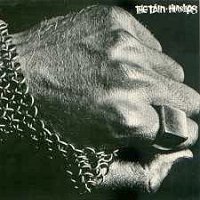 Horslips was one of the first rock bands from Ireland to make an impression outside their native country, and their wonderful blend of Tull-ish progressive rock combined with traditional Irish folk music sounds just as refreshing today as it must have done back in the 70's. Their second release "The TŠin" was a concept-album based on the ancient Irish legend of the same name. It perfectly demonstrates Horslips' sound and style very well, and their sense for mixing traditional jigs and themes into their own material shines through all the way. The arrangements are spiced with lots of violin, flute, mandolin and even some uilleann-pipes to give the music an unmistakable Irish feel and atmosphere. The opening theme "Setanta" builds up from a swirling organ into a quite heavy riff before it's lead over in the traditional sounds of "Maeve's Court" that left no doubt about where this guys came from. "Charolais" and "You Can't Fool the Beast" are two excellent and melodic songs tied together by the two-part "The March" and this was again a piece based on an old traditional theme. "Dearg Doom" is a heavier tune that became one of the best-known songs from the record. The theme from "Seanta" is repeated in "Ferdia's Song" to underline the conceptual feel of the album. Side 2 opens with the mellow "Cu Chulainn's Lament" and this is followed by another laid-back tune in form of the lullaby-like "Faster Than the Hound". The instrumental "The Silver Spear" is made up of three traditional tunes, and gives the listener a needed dose of energy after two ballads in a row. The uilleann-pipes take a leading role in the cheerful "More Than You Can Chew" that was based on an Irish march, and it was even released as a single. "The Morrigan's Dream" was yet another prog-version of a traditional jig, and it lead into the closer "Time to Kill!". The vocal-harmonies on this track reminds me strongly of Capability Brown's album "Voice" from the same year. "The TŠin" is easily one of Horslips' finest moments. Horslips was one of the first rock bands from Ireland to make an impression outside their native country, and their wonderful blend of Tull-ish progressive rock combined with traditional Irish folk music sounds just as refreshing today as it must have done back in the 70's. Their second release "The TŠin" was a concept-album based on the ancient Irish legend of the same name. It perfectly demonstrates Horslips' sound and style very well, and their sense for mixing traditional jigs and themes into their own material shines through all the way. The arrangements are spiced with lots of violin, flute, mandolin and even some uilleann-pipes to give the music an unmistakable Irish feel and atmosphere. The opening theme "Setanta" builds up from a swirling organ into a quite heavy riff before it's lead over in the traditional sounds of "Maeve's Court" that left no doubt about where this guys came from. "Charolais" and "You Can't Fool the Beast" are two excellent and melodic songs tied together by the two-part "The March" and this was again a piece based on an old traditional theme. "Dearg Doom" is a heavier tune that became one of the best-known songs from the record. The theme from "Seanta" is repeated in "Ferdia's Song" to underline the conceptual feel of the album. Side 2 opens with the mellow "Cu Chulainn's Lament" and this is followed by another laid-back tune in form of the lullaby-like "Faster Than the Hound". The instrumental "The Silver Spear" is made up of three traditional tunes, and gives the listener a needed dose of energy after two ballads in a row. The uilleann-pipes take a leading role in the cheerful "More Than You Can Chew" that was based on an Irish march, and it was even released as a single. "The Morrigan's Dream" was yet another prog-version of a traditional jig, and it lead into the closer "Time to Kill!". The vocal-harmonies on this track reminds me strongly of Capability Brown's album "Voice" from the same year. "The TŠin" is easily one of Horslips' finest moments.
Horslips - "The Book of Invasions - A Celtic Symphony" (DJM 1976)
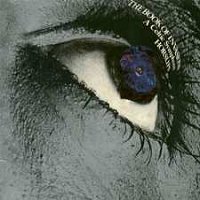 Horslips released three less successful records after the classic "The TŠin" and the promises of that album wasn't really fulfilled before they in 1976 again turned to ancient Irish myths to make a concept-album. The result was entitled "The Book of Invasions - A Celtic Symphony" and is well deservedly regarded as Horslips' definitive masterpiece. Just as "The TŠin" it consisted of no less than 14 songs, but they were this time divided into three lengthy movements. The first one was called "Geantrai" and runs for over 20 minutes. The songs in this movement are tied together by an old traditional tune that appears several times between the tracks. The songs in this piece were some of the strongest the band ever had: "Trouble With a Capital "T"", "The Power and the Glory" and the stunning "Sword of Light" that must be one of the best fusions of rock and traditional Irish folk-music ever recorded. The second movement "Goltrai" opens with the light-weighted but catchy "Warm Sweet Breath of Love" that goes into the instrumental theme "Fantasia - My Lagan Love". The best song in "Goltrai" is still the excellent "King of Morning, Queen of Day" that is another example of the band's talent for turning a traditional jig into their own composition. The third and final movement is called "Suantrai" and starts with the pleasant "Sideways to the Sun" that is based on an old traditional ballad. "Drive the Cold Winter Away" is an instrumental interlude that leads into the far more aggressive "Ride to Hell" that closes the album in the best way possible. This is an album so stuffed with great and inspired music that not a single second of it is redundant. Highly recommended. Horslips released three less successful records after the classic "The TŠin" and the promises of that album wasn't really fulfilled before they in 1976 again turned to ancient Irish myths to make a concept-album. The result was entitled "The Book of Invasions - A Celtic Symphony" and is well deservedly regarded as Horslips' definitive masterpiece. Just as "The TŠin" it consisted of no less than 14 songs, but they were this time divided into three lengthy movements. The first one was called "Geantrai" and runs for over 20 minutes. The songs in this movement are tied together by an old traditional tune that appears several times between the tracks. The songs in this piece were some of the strongest the band ever had: "Trouble With a Capital "T"", "The Power and the Glory" and the stunning "Sword of Light" that must be one of the best fusions of rock and traditional Irish folk-music ever recorded. The second movement "Goltrai" opens with the light-weighted but catchy "Warm Sweet Breath of Love" that goes into the instrumental theme "Fantasia - My Lagan Love". The best song in "Goltrai" is still the excellent "King of Morning, Queen of Day" that is another example of the band's talent for turning a traditional jig into their own composition. The third and final movement is called "Suantrai" and starts with the pleasant "Sideways to the Sun" that is based on an old traditional ballad. "Drive the Cold Winter Away" is an instrumental interlude that leads into the far more aggressive "Ride to Hell" that closes the album in the best way possible. This is an album so stuffed with great and inspired music that not a single second of it is redundant. Highly recommended.
Label
Steve Howe - "Beginnings" (Atlantic 1975)
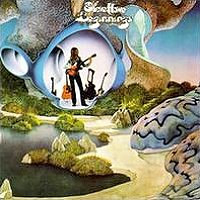 "Beginnings" was Steve Howe's solo-debut and it sounded overall most like a folkier version of the Yes-sound with less emphasis on the keyboards. The guest-musicians included people like Bill Bruford, Alan White, Patrick Moraz and even several members of Gryphon! The material on the album is decent and varied. However, the problem here is the vocals of Howe himself. His voice fitted well into the vocal-harmonies in Yes, but it reveals itself as very thin and helpless when it stands alone. And this means that good songs like "Doors of Sleep" and "Australia" unfortunately never reaches the heights they could have with a good singer. "Pleasure Stole the Night" is a track in the same rural style and sound as the two earlier mentioned songs, while "Lost Symphony" benefits from a cool sax-riff. "Will O' the Wisp" is the most typical progressive track here, with an atmospheric Mellotron-break in the middle. "Break Away From it All" is the most rocking moment on the whole album, and Howe demonstrates some of his excellent and very distinctive playing here. There's also three instrumental-numbers here, including the complex and orchestrated title-track and the ultra-typical, Howe-like "Ram". "Nature of the Sea" is maybe the best showcase on the album for his guitar-playing. "Beginnings" is a listenable album, but it would have been better if Howe had got someone else to do the vocals. "Beginnings" was Steve Howe's solo-debut and it sounded overall most like a folkier version of the Yes-sound with less emphasis on the keyboards. The guest-musicians included people like Bill Bruford, Alan White, Patrick Moraz and even several members of Gryphon! The material on the album is decent and varied. However, the problem here is the vocals of Howe himself. His voice fitted well into the vocal-harmonies in Yes, but it reveals itself as very thin and helpless when it stands alone. And this means that good songs like "Doors of Sleep" and "Australia" unfortunately never reaches the heights they could have with a good singer. "Pleasure Stole the Night" is a track in the same rural style and sound as the two earlier mentioned songs, while "Lost Symphony" benefits from a cool sax-riff. "Will O' the Wisp" is the most typical progressive track here, with an atmospheric Mellotron-break in the middle. "Break Away From it All" is the most rocking moment on the whole album, and Howe demonstrates some of his excellent and very distinctive playing here. There's also three instrumental-numbers here, including the complex and orchestrated title-track and the ultra-typical, Howe-like "Ram". "Nature of the Sea" is maybe the best showcase on the album for his guitar-playing. "Beginnings" is a listenable album, but it would have been better if Howe had got someone else to do the vocals.
Steve Howe - "The Steve Howe Album" (Atlantic 1979)
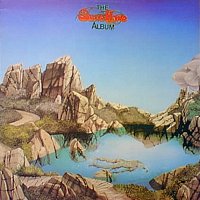 Howe didn't need to do anything else than keep his mouth shut to make his second solo-album better than "Beginnings". With the exception of the last minute of "All's a Chord" and "Look Over Your Shoulder" (sung by Claire Hamill) the album is an instrumental work. This means that you can enjoy Howe's unique and distinctive guitar-playing without getting annoyed by his weak vocals. Many of the tracks on the album have a rural and cheerful feel to them, like "Diary of a Man Who Vanished" and "The Continental". The same goes for the opening-track "Pennants" but with an electric and much more rocking sound. "Meadow Rag" and "Surface Tension" are two quiet and moody pieces performed on acoustic guitar only. "All's A Chord" combines the style of those two tracks with more uptempo and powerful prog-rock parts. There's even some country here in "Cactus Boogie". But the highlights for me are the two last tracks on the album. First you have Howe's own "Double Rondo" where his very emotional playing is backed up by a whole orchestra. Then you have a version of Vivaldi's "Concerto in D, 2nd Movement" that reminds strongly of the most quiet passages from Camel's "The Snow Goose". Beautiful and atmospheric stuff. And the cover was one of Roger Dean's most mysterious and controversial ones, showing the nude body of a dead man (or woman?) floating in the water of the wonderful fantasy-landscape. Howe didn't need to do anything else than keep his mouth shut to make his second solo-album better than "Beginnings". With the exception of the last minute of "All's a Chord" and "Look Over Your Shoulder" (sung by Claire Hamill) the album is an instrumental work. This means that you can enjoy Howe's unique and distinctive guitar-playing without getting annoyed by his weak vocals. Many of the tracks on the album have a rural and cheerful feel to them, like "Diary of a Man Who Vanished" and "The Continental". The same goes for the opening-track "Pennants" but with an electric and much more rocking sound. "Meadow Rag" and "Surface Tension" are two quiet and moody pieces performed on acoustic guitar only. "All's A Chord" combines the style of those two tracks with more uptempo and powerful prog-rock parts. There's even some country here in "Cactus Boogie". But the highlights for me are the two last tracks on the album. First you have Howe's own "Double Rondo" where his very emotional playing is backed up by a whole orchestra. Then you have a version of Vivaldi's "Concerto in D, 2nd Movement" that reminds strongly of the most quiet passages from Camel's "The Snow Goose". Beautiful and atmospheric stuff. And the cover was one of Roger Dean's most mysterious and controversial ones, showing the nude body of a dead man (or woman?) floating in the water of the wonderful fantasy-landscape.
HÝst - "PŚ Sterke Vinger" (On 1974)
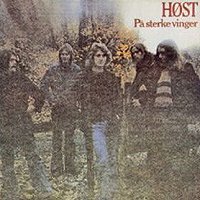 Legendary Norwegian heavy-progressive group. The sound of their debut-album is strongly dominated by the heavy and aggressive guitar work of Lasse Nilsen and Svein RÝnning. The latter also played mini-moog, grand piano, clavinette and organ on some tracks, adding a progressive edge to their sound. The tracks are very well crafted and based in strong riffs and melodies. Most of the songs are quite heavy, but "I Ly Av MÝrket" and the wonderful, 10-minute title-track shows the band from a mellow and relaxed side. The mini-moog is used to great effect on "Satans Skorpe" and that's probably also the most complex track on the album. The guitar-playing on this track reminds me a lot of the opening chords of Nektar's "Remember the Future". Other great tracks includes the opener "Fattig Men Fri", "Dit Vi MŚ" and "Det Er For Sent Ň Angre". Actually there's not a bad track here at all, and this is one of the classics of Norwegian 70's rock/progressive. But the next album was even better and more progressive... Legendary Norwegian heavy-progressive group. The sound of their debut-album is strongly dominated by the heavy and aggressive guitar work of Lasse Nilsen and Svein RÝnning. The latter also played mini-moog, grand piano, clavinette and organ on some tracks, adding a progressive edge to their sound. The tracks are very well crafted and based in strong riffs and melodies. Most of the songs are quite heavy, but "I Ly Av MÝrket" and the wonderful, 10-minute title-track shows the band from a mellow and relaxed side. The mini-moog is used to great effect on "Satans Skorpe" and that's probably also the most complex track on the album. The guitar-playing on this track reminds me a lot of the opening chords of Nektar's "Remember the Future". Other great tracks includes the opener "Fattig Men Fri", "Dit Vi MŚ" and "Det Er For Sent Ň Angre". Actually there's not a bad track here at all, and this is one of the classics of Norwegian 70's rock/progressive. But the next album was even better and more progressive...
HÝst - "Hardt Mot Hardt" (On 1976)
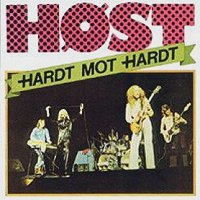 Vocalist Geir Jahren and bass-player Bernt Bodahl was the only remaining members from the line-up of the first album. The new guitarist wrote most of the material for "Hardt Mot Hardt" (with the exception of the short, folk-influenced instrumental "Ňse" that was written by Jahren) and he also played some flute in addition to his excellent guitar work. The band had also got a permanent keyboard-player (mostly organ and piano). The sound of this album is much more progressive and complex than the first album and even more heavy! "Hardt Mot Hardt" is simply one of the very best Norwegian albums ever made. The playing is so tight and perfect as it can be and all the compositions are flawless. They even add some accordion on "Sirkus". "Lektyre" featured a whole symphonic-orchestra to back up the great voice of Jahren. "∆rśeo" sounds like a heavy-prog mix of Gentle Giant and Jethro Tull. Other tracks like "Profeters Ord", "Gorobin" and "Nattergalen" are heavy-progressive masterpieces in themselves. This is with no doubt one of the very first Norwegian 70's progressive albums you should get. "Hardt..." was followed by a compilation called "Extra Extra" that also included two new tracks with English lyrics. The band was planning an international career and changed name to Ice, but they disbanded before anything could happen. Vocalist Geir Jahren and bass-player Bernt Bodahl was the only remaining members from the line-up of the first album. The new guitarist wrote most of the material for "Hardt Mot Hardt" (with the exception of the short, folk-influenced instrumental "Ňse" that was written by Jahren) and he also played some flute in addition to his excellent guitar work. The band had also got a permanent keyboard-player (mostly organ and piano). The sound of this album is much more progressive and complex than the first album and even more heavy! "Hardt Mot Hardt" is simply one of the very best Norwegian albums ever made. The playing is so tight and perfect as it can be and all the compositions are flawless. They even add some accordion on "Sirkus". "Lektyre" featured a whole symphonic-orchestra to back up the great voice of Jahren. "∆rśeo" sounds like a heavy-prog mix of Gentle Giant and Jethro Tull. Other tracks like "Profeters Ord", "Gorobin" and "Nattergalen" are heavy-progressive masterpieces in themselves. This is with no doubt one of the very first Norwegian 70's progressive albums you should get. "Hardt..." was followed by a compilation called "Extra Extra" that also included two new tracks with English lyrics. The band was planning an international career and changed name to Ice, but they disbanded before anything could happen.

|